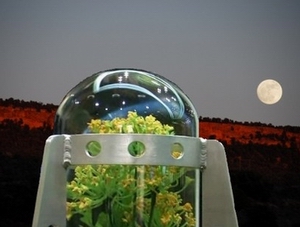 ing to grow plants and vegetables – such as turnip and basil – on the Moon, by 2015, to understand whether humans can live and work on the Earth’s natural satellite.
ing to grow plants and vegetables – such as turnip and basil – on the Moon, by 2015, to understand whether humans can live and work on the Earth’s natural satellite. The US space agency will deposit plants, on-board a commercial lunar lander, on the Moon’s surface within the next two years, NASA said. The initiative is being driven by the Lunar Plant Growth Habitat team. They intend to use coffee-can sized containers designed to protect the plants against harsh elements of the climate, and will also provide cameras, sensors, and electronics in order to relay information about how the plants fare back to Earth.
Nasa’s plan is “to develop a very simple sealed growth chamber that can support germination over a five to-ten day period in a spacecraft on the Moon.” The containers will attempt to grow turnip, basil and Arabidopsis. Nasa’s plan is to find some answers when this “self-contained habitat,” which will have a mass of about one kg and would be a payload on a commercial lunar lander, is on the Moon.
After landing on Moon, water will be added to the seeds in the module – a trigger would release a small reservoir of water wetting filter paper and initiating germination of the seeds, ‘Phys.org’ reported. Air in the sealed container would be adequate for more than five days of growth. Their growth will be monitored for five to ten days and compared to Earth-based controls. The seedlings would be photographed at intervals.
“We would use the natural sunlight on the Moon as the source of illumination for plant germination as a first ISRU (in situ resource utilisation) demonstration,” said NASA. Nasa believes the effort will yield returns on two fronts, knowledge about plants and broader knowledge about life’s chances on the Moon. The information about the plants may help NASA better address the question if humans can live and work on the Moon. Last year, Chinese scientists announced their plans to grow fresh vegetables in extraterrestrial bases on Moon or Mars to provide food and oxygen supplies to astronauts.





